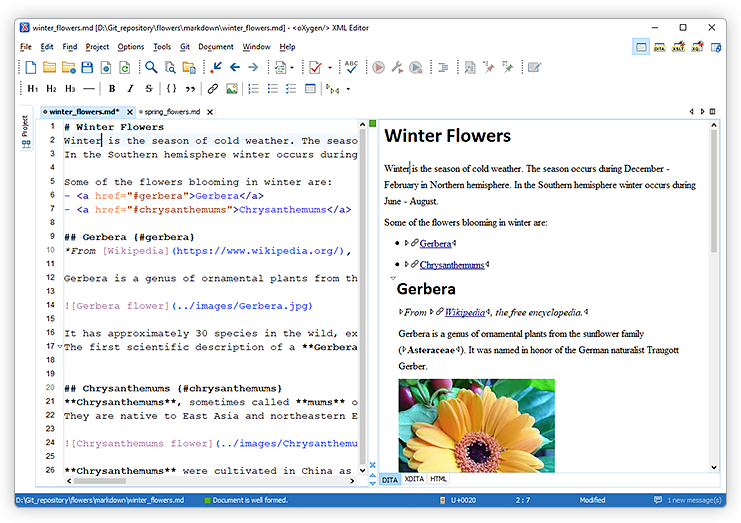- Gotenberg is a Docker-powered stateless API for converting HTML, Markdown and Office documents to PDF. HTML and Markdown conversions using Google Chrome headless.
- Just focus the window containing your markdown file and use the convert command (Packages Markdown PDF Convert). The output PDF will be styled similar to the markdown on github.com, as well as any user styles you have added. It will appear in the same directory as the Markdown you are converting, with the same name and a.pdf extension.
Remote android windows. A markdown-converter for Visual Studio Code
What's MarkdownConverter?
In this tutorial, we will render or knit an R Markdown document to a web friendly, html format using the R knitr package. Knitr can be used to convert R Markdown files to many different formats including: html, pdf, GitHub markdown (.md) and more.
MarkdownConverter is a Visual Studio Code-extension which allows you to export your Markdown-file as PDF-, HTML or Image-files.
It provides many features, such as DateTime-Formatting, configuring your own CSS-styles, setting Headers and Footers, FrontMatter and much more.
Usage
- Set your desired conversion-types or skip this step to convert your markdown-file to
PDF:- Open up your Visual Studio Code-Settings and set
markdownConverter.ConversionTypeto an array of types:
- Open up your Visual Studio Code-Settings and set
- Optionally set the pattern for resolving the destination-path:
- Open up the command pallet (Ctrl, Shift+P) and search one of these commands:
Markdown: Convert Document(Markdown: Dokument Konvertierenin German) ormco(mkin German) for shortMarkdown: Convert all Documents(Markdown: Alle Dokumente konvertieren) ormcd(madkin German) for shortMarkdown: Chain all Documents(Markdown: Alle Dokumente verketten) ormcad(madvin German) for short
- Press enter and wait for the process to finish
Variable Substitution
Before the conversion, the markdown-file is preprocessed using Handlebars. Variables (such as {{ Author }}) are automatically replaced with the corresponding attribute-value.
Example: Microsoft 365 business basic vs office e1.
Following attributes are predefined and may be overridden by the document-attributes:
CreationDate
ADate-value indicating the time of the creation of the markdown-fileChangeDate
ADate-value indicating the time of the last change of the content of the markdown-fileCurrentDate
ADate-value representing the time of the conversionAuthor
The assumed name of the author according toGIT_AUTHOR_NAME,GIT_COMMITER_NAME,HGUSER,C9_USER,git,wmicorosascript- Attributes declared inside the vscode-settings (see Settings)
Date-Formatting
Date-attributes are being formatted by default. MarkdownConverter allows you to customize the format of every individual date.
You can format an individual date by using the FormatDate-helper like this:
Example:

You can override the default date-format for a document by adding a DateFormat attribute:
Example:
Custom Date-Formats
Markdown To Pdf Download
There are two predefined date-formats, namely Default and FullDate, which represent date-formats for your current locale.
If you use a specific date-format repeatedly you might want to specify a custom date-format using the markdownConverter.DateFormats setting (see [Settings][#settings]):

settings.json

Example

Settings
This is a list of the most important settings. To see all of them, install the extension and have a look into the settings-dialogue of vscode.
Markdown To Pdf Java
markdownConverter.DestinationPattern:
Allows you to specify a pattern for resolving the destination-path. Following variables are substituted:${workspaceFolder}: Either the path to theworkspaceor the directory which contains the document.${dirname}The relative path from the${workspaceFolder}to the directory which contains the document.${basename}: The name of the document-file without extension.${extension}: The file-extension of the destination-datatype.${filename}: The name of the document-file.
markdownConverter.ConversionType:
The types to convert the markdown-document to.markdownConverter.DefaultDateFormat:
The date-format to apply to all dates by default.markdownConverter.DateFormats:
A set of names and their corresponding custom date-format.markdownConverter.ChromiumArgs:
Allows you to pass specific arguments to chromium for the conversion (such as--no-sandboxor--disable-gpu).markdownConverter.Parser.SystemParserEnabled:
This setting allows you to enable or disable the usage ofvscodes internal markdown-parser. Using the internal markdown-parser might be very useful to you as it grants you access to all markdown-plugin extensions installed to your vscode.markdownConverter.Parser.Toc.Enabled:
Allows you to automatically include a table-of-contents for your document in your converted files.markdownConverter.Document.Attributes:
Using this setting you can specify default attributes which are applied to all your documents.markdownConverter.HeaderTemplateandmarkdownConverter.FooterTemplate:
The html-sourcecode of the header- and footer-section. Variable-substituion is supported here as well. Page-numbers and similar information can be included as described in the puppeteer docs.markdownConverter.DefaultStyles:
Allows you to disable the default styles. This might be useful if you want to create your own stylesheet from scratch.markdownConverter.StyleSheets:
A set of stylesheets to include in your document.
